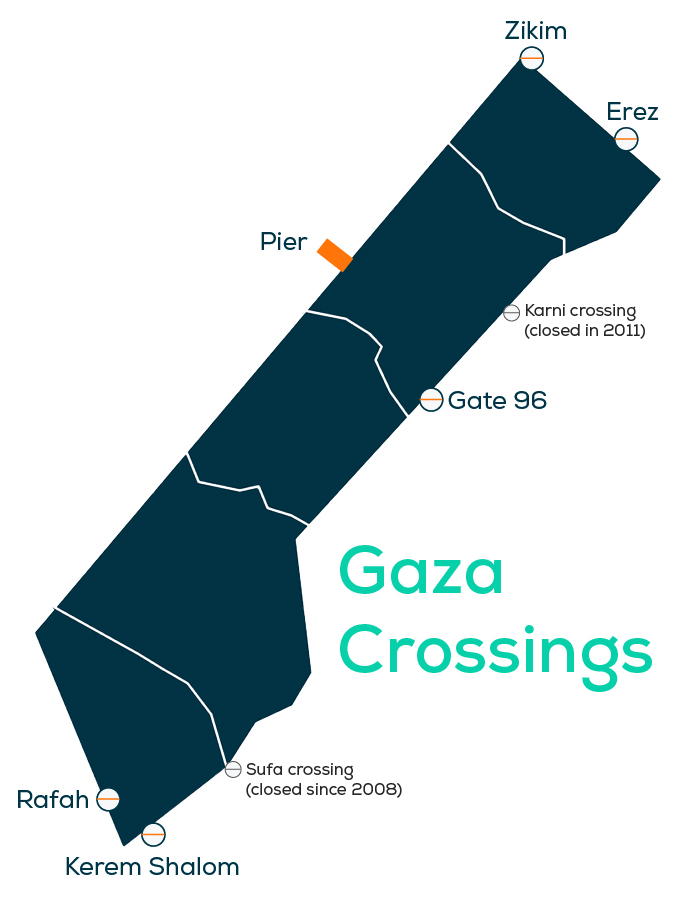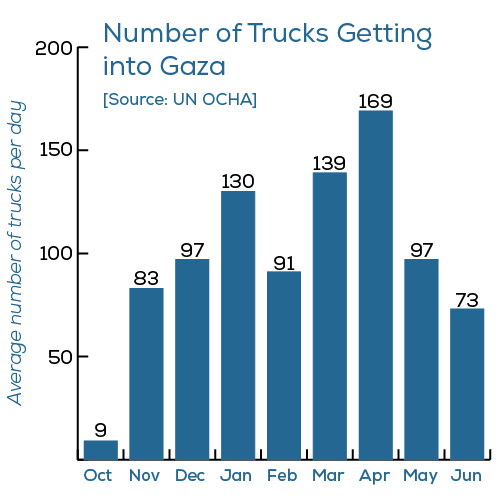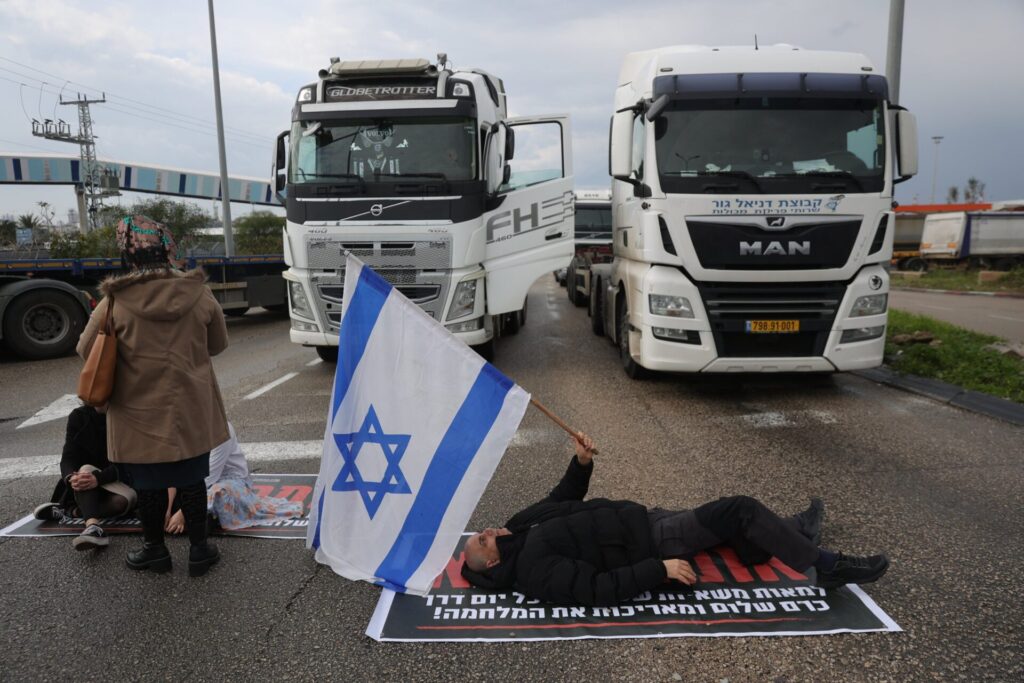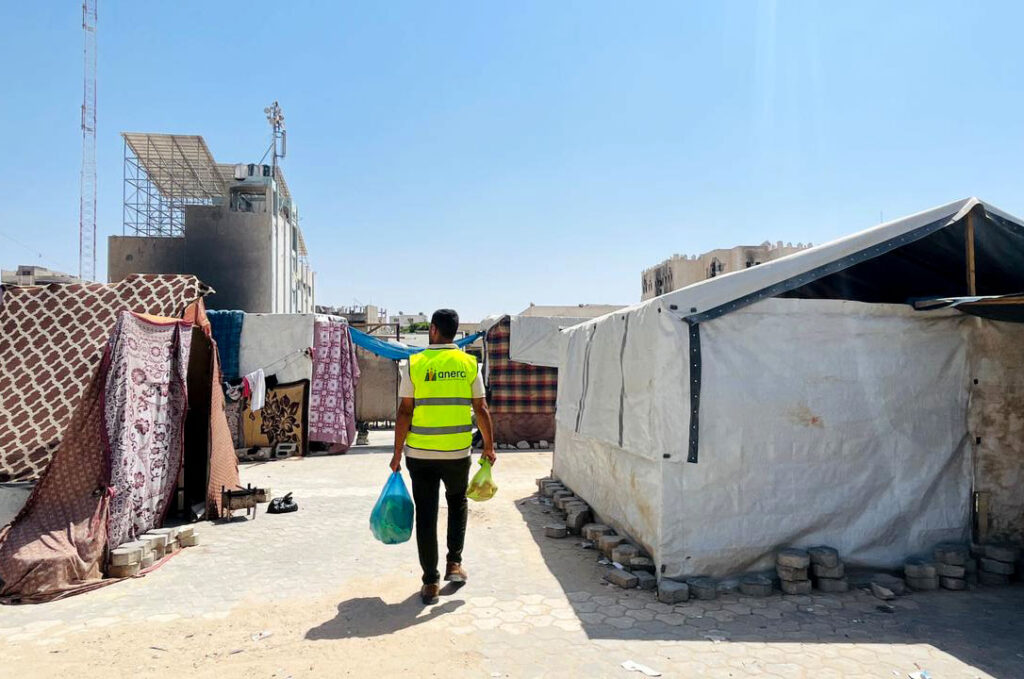Overcoming the Struggle to Delivering Aid in Gaza
Posted in: Statement
Despite the scope of the needs – most of Gaza’s population is hungry, homeless and vulnerable to illnesses – there is not nearly enough aid getting into and around Gaza. Anera, UN entities and other international and local non-governmental organizations are continually coordinating a steady stream of humanitarian aid going into and being distributed inside Gaza. Some trucks are indeed entering, but delivery is slowed by the long wait for approvals and confirmation of routes at different stages of their journeys.
The processes required to get aid into and around Gaza are inconsistent and ever-changing. Coordination is needed at multiple levels, including approvals from Israel, which dictates movements into and within Gaza.
Unpredictable Entry
While there are seven official crossings available to Gaza, only three are currently operational (the open, operational entry points have ranged from one to four, and change all the time), and those crossings are subject to frequent, unanticipated or unexplained closures. Approvals that are granted can be canceled at the last minute for security or other reasons.


Lengthy delays and unpredictable processes for the inspection of trucks also slow the entry of aid. The application of an expansive and often arbitrary list of ‘dual use’ items complicate approvals as well. For instance, shipments can be rejected completely or slowed by inspections that that inspectors claim could be used for military purposes. Items that have been rejected on these grounds include tents, medical equipment, nail-clippers, vitamins, chlorine tablets, and batteries.
Not Enough Aid Is Getting Into Gaza
Before the war began, approximately 500 trucks carrying commercial goods and aid entered Gaza every workday. Since October, the months with the highest average number of trucks were April at 169/day and March at 139/day. In recent months, trucks of commercial goods have been permitted entry and given priority over aid trucks. In May, the daily average of aid trucks was 97/day — and June’s average so far is a meager 73 aid trucks/day. The amount of food and other kinds of aid entering Gaza is grossly inadequate to meet the soaring needs.


Security Issues
The transportation of aid through Israel to Gaza is sometimes marred by demonstrations or violence. Since mid-May, there have been multiple attacks in Israel and the West Bank by Israelis on Palestinian trucks suspected of carrying goods to Gaza. The attacks have resulted in injuries, damaged goods, and even truck fires.
Once aid gets into Gaza, it needs to be transported from the crossing points around Gaza. The situation on the ground is perilous and chaotic, however, making it very challenging to deliver aid effectively. Organizations transporting aid face looters and grapple with smugglers. Long months of increasingly dire conditions and the elimination of civil police have led to the emergence of war profiteering and looting borne of desperation.
Humanitarian organizations like Anera face a daunting task in protecting their convoys. Escort teams, crucial for ensuring safe delivery, are often fearful and reluctant to perform their duties under such dangerous conditions.


What Needs to Happen to Alleviate the Suffering in Gaza
An enduring ceasefire is the most important step to slow the loss of life, and ensure aid reaches suffering families in Gaza effectively. Until a ceasefire is agreed upon, the following measures are urgently needed:
Better Safety and Security
- Better coordination and deconfliction: Improved coordination between all parties to mitigate conflicts and ensure safe passage for aid workers.
- New rules of engagement: Implementing rules that offer greater protection to aid and health workers, journalists, and civilians.
Improved Aid Access and Distribution
- Open all crossings: All entry points, including Rafah, Kerem Shalom, Erez, Zikim, Gate 96, and the pier, must be opened to facilitate aid flow uninterrupted.
- Streamlined delivery: Quicker, consistent and more efficient delivery processes through Ashdod and the West Bank.
- Lift ban on commercial goods: Remove the ban on goods previously allowed but now considered contraband, which is causing scarcity, profiteering, and theft.
- Security arrangements: Reconstitute the “blue police” or a similar security force to ensure the safe distribution of aid.
Commitment to support essential services
- Emergency water and sanitation needs: Address all urgent water, sanitation, and hygiene requirements.
- Medical care: Ensure the provision of necessary medical services and supplies.
- Electrical infrastructure and fuel: Restore and maintain electrical lines and allow provision of adequate fuel supplies.
- Food aid: Maintain and increase the supply of food aid to meet the needs of the population.
We need to see – immediately – a concerted effort from the international community and Israel to achieve these goals and provide the necessary aid to Gaza.
Anera’s Deliveries into Gaza
Anera has so far been able to successfully bring into Gaza over 700 trucks of humanitarian aid, containing vital items like food, , medicines and medical supplies, water, tents, blankets, menstrual pads, hygiene kits and more. Anera’s staff across Palestine has facilitated the delivery of more than 30 million meals, nearly seven million treatments of medicines, 58,000 packs of menstrual pads, 334 psychosocial sessions and more. Learn more at our daily response log.


OUR BLOG
Related
Amal’s story is just like many others in Gaza who struggle with displacement and lack the basic necessities to survive.
In North Lebanon, Anera, in partnership with UNICEF, is training new educators in special education for children.
More than 100,000 people are internally displaced in Lebanon. One of the displaced persons is retired Lebanese Professor Khalil, who speaks to the pain of a life of forced displacement.
